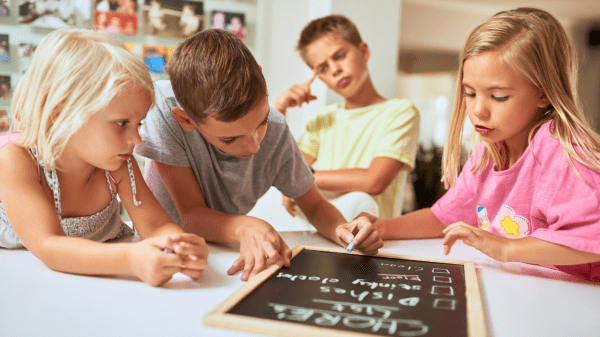As the new school year begins, many children experience a mix of excitement and anxiety. For some, school can be overwhelming and frightening, whether it’s the fear of the unknown, separation from parents, or social challenges. As a parent, helping your child navigate these emotions and fostering a positive attitude towards school is crucial. Conscious Discipline offers powerful strategies to guide your child through these fears, helping them build confidence and resilience.
Understanding School-Related Fears
Before diving into strategies, it’s important to understand the common fears children might have about school. These can include:
- Separation Anxiety: Fear of being away from parents or primary caregivers
- Fear of the Unknown: Anxiety about a new environment, new routines, or new people
- Social Fears: Worry about making friends, fitting in, or dealing with peer pressure
Identifying the specific fear your child is experiencing is the first step in helping them overcome it. Here are some Conscious Discipline strategies for instilling positivity and guiding your child through the process of overcoming those fears.
Create a Safe and Supportive Environment
Children thrive when they feel safe and supported. Start by creating a home environment where your child feels secure in expressing their emotions. Listen actively to their concerns about school without dismissing or minimizing their feelings.
Conscious Discipline Tip💡Use the Safe Place strategy, a designated area in your home where your child can go to calm down and process their emotions. Fill the space with comforting items like a favorite stuffed animal, calming music, or a book. This teaches your child that it’s okay to feel anxious and gives them a safe way to manage those feelings.

Teach Positive Self-Talk
Positive self-talk is a powerful tool that can help children shift their mindset from fear to confidence. Encourage your child to replace negative thoughts with affirmations, such as “I can do this,” “I am brave,” or “I am good at making friends.”
Conscious Discipline Tip💡Model positive self-talk in your daily interactions. For example, if you’re facing a challenge, verbalize your own process of calming down and finding a positive solution. This shows your child how to apply the same strategies when they feel afraid.
Use the Power of Perception
The way we perceive a situation greatly influences our emotional response. Help your child reframe their perception of school from a place of fear to a place of opportunity and growth.
Conscious Discipline Tip💡Engage in role-playing games where you and your child act out different school scenarios. Using these opportunities can highlight the positive aspects of school, for example, like making new friends, learning exciting things, or playing during recess. By changing how they perceive school, you can help diminish their fears.
Practice Deep Breathing Techniques
Deep breathing is an effective way to manage anxiety and calm the nervous system. Teaching your child simple breathing exercises can empower them to handle moments of fear or stress at school.
Conscious Discipline Tip💡 Introduce the “S.T.A.R.” breathing technique (Smile, Take a deep breath, And Relax) to your child. Practice it together in the mornings before school or whenever they start to feel anxious. This technique not only calms their nerves but also gives them a tool they can use independently at school.
Focus on Connection Before Correction
When your child expresses fear or anxiety about school, focus on connecting with them emotionally before trying to correct their behavior or mindset. This builds trust and lets your child know that their feelings are valid and important.
Conscious Discipline Tip💡 Use the I Love You Rituals. I Love Rituals are a series of playful, interactive activities that reinforce your connection with your child. These rituals are perfect for starting the day on a positive note and can help reduce separation anxiety!

Establish a Predictable Routine
Routines create a sense of security and help children feel more in control of their environment. Establishing a consistent morning and evening routine can make the transition to school smoother and reduce anxiety.
Conscious Discipline Tip💡 Involve your child in creating a visual schedule of their daily routine. This can include waking up, getting dressed, eating breakfast, going to school, and what happens after school. Knowing what to expect each day can greatly reduce fear of the unknown.
Celebrate Small Wins
Acknowledge and celebrate your child’s efforts to face their fears, no matter how big or small. Positive reinforcement helps build their confidence and encourages them to keep trying.
Conscious Discipline Tip💡 At the end of each school day, take a moment to ask your child about something positive that happened. Celebrate these moments together, reinforcing that school is a place where good things happen.
Guiding your child through school-related fears with Conscious Discipline strategies not only helps them feel more positive about school but also guides them and lays the foundation for lifelong skills for managing emotions and building resilience. By creating a supportive environment, teaching positive self-talk, and focusing on connection, you can help your child view school as a place of growth and opportunity rather than fear.
Remember, it’s not about eliminating your child’s fears altogether, but about empowering them to face and overcome these fears with confidence and positivity.

